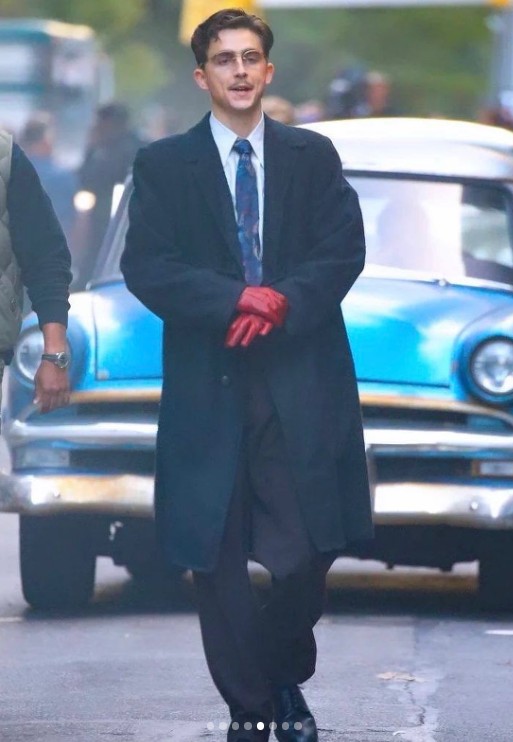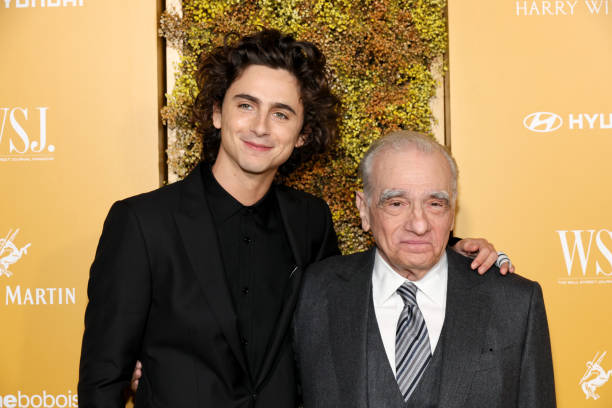In a historic announcement that reverberated through the global film industry, acclaimed director Martin Scorsese has confirmed that his upcoming film will be his final directorial work—and it will feature none other than the generational talent Timothée Chalamet in the lead role. Titled “The Last Frame,” the film is set to be a sweeping period drama that explores the death of the silent film era and the birth of the Hollywood soundscape. For Scorsese, 82, whose career has shaped the very fabric of American cinema, this project represents a poetic and reflective swan song.
A Final Bow from a Cinematic Titan

With a legacy spanning over six decades, Martin Scorsese has long been one of cinema’s most revered auteurs. From Taxi Driver and Goodfellas to The Departed and Killers of the Flower Moon, his storytelling has always leaned into moral complexity, character-driven narratives, and stylistic brilliance. Now, as he prepares to step away from the director’s chair, Scorsese seems intent on making one last, resonant statement about the very medium he has spent his life championing.
Sources close to the production describe The Last Frame as a “love letter to cinema” that will transport audiences to 1920s Hollywood, at a time when silent films were giving way to talkies. The film will reportedly explore not only the artistic tensions of that transformative era but also the personal sacrifices made by those caught in the tide of technological change. In an emotional video statement, Scorsese said, “This is the story I’ve been waiting my whole life to tell, because it is also the story of the very beginning of the path that led me here.”
Chalamet: The Natural Heir to Old Hollywood Charm

The casting of Timothée Chalamet is both a strategic and symbolic decision. At just 29, Chalamet has carved out a career that blends indie credibility with mainstream stardom. Known for roles in Call Me by Your Name, Dune, and Wonka, he has been praised for his emotional depth, classical poise, and ability to embody complex characters with ease.
Chalamet will portray Gabriel Leclair, a fictional French-American actor caught between artistic idealism and the pressure to adapt to the rapidly changing landscape of Hollywood in the late 1920s. The role is said to require both silent-era expressive acting and nuanced vocal performance, demanding a dual mastery that few modern actors could convincingly deliver.
Chalamet expressed his excitement on social media, calling the opportunity “the honor of a lifetime.” In an accompanying photograph, he is seen seated beside Scorsese, the two smiling warmly in a dimly lit editing room—a symbolic image of one generation passing the torch to another.
A Period Epic Steeped in History and Emotion

Set against the backdrop of a turbulent industry in transition, The Last Frame will follow Gabriel’s rise and fall as he navigates the shifting tectonics of fame, fidelity to art, and personal reinvention. The script, co-written by Scorsese and longtime collaborator Jay Cocks (Gangs of New York, Silence), is expected to draw on real historical events and figures, including nods to early stars like Buster Keaton, Clara Bow, and John Gilbert.

Filming is slated to begin in October 2025, with production scheduled to take place primarily in Los Angeles and parts of New York. Vintage studios and practical sets will recreate iconic locations of the 1920s, from the golden-laden rooms of Hollywood mansions to dusty backlots and silent soundstages echoing with phantom reels.
Early production sketches suggest a visual tone inspired by German expressionism, golden age Americana, and even touches of noir. Music, reportedly under the direction of acclaimed composer Hildur Guðnadóttir, will blend orchestral elements with early jazz and vaudeville recordings.
An All-Star Ensemble and Creative Team
Beyond Chalamet, the film has already attracted an ensemble cast of powerhouse performers. While official casting announcements remain under wraps, insiders hint that Oscar-winning actors are circling key roles, including that of a once-famous silent film actress clinging to relevance, and a ruthless studio executive determined to control the new order of sound.
Costume designer Jacqueline Durran, known for her work on Atonement and Little Women, has signed on to deliver historically accurate yet evocative wardrobe pieces, while cinematographer Rodrigo Prieto, who worked with Scorsese on The Irishman and Killers of the Flower Moon, returns to capture the lush visuals.
The film will be distributed globally by a major studio, with a prestigious festival premiere eyed for Cannes 2026, where Scorsese is expected to be honored for lifetime achievement. A limited theatrical release will precede a wider rollout, with strong awards season momentum anticipated.
A Reflection on Legacy
For Scorsese, The Last Frame is more than just a film—it is an elegy. As cinema continues to evolve in the age of streaming, AI, and digital saturation, the director seems to be making a final, poignant case for the soul of storytelling. “I’m not interested in saying goodbye,” he remarked in a recent interview. “I’m interested in leaving a mirror behind. One that reflects where we came from, and maybe where we’re going.”
Industry veterans and younger filmmakers alike have already begun sharing tributes. Directors such as Christopher Nolan, Greta Gerwig, and Spike Lee have praised Scorsese’s decision to end on his own terms, crafting a work of passion and personal resonance. Film critics, meanwhile, are preparing retrospectives and essays contextualizing the magnitude of this finale.
Chalamet, in a separate interview, reflected on what the opportunity means to him: “To walk through the fire of a story this rich, under the guidance of the greatest living filmmaker, is humbling. I only hope I can do justice to the part—and to the art form he’s built his life around.”
Looking Ahead

While The Last Frame marks the conclusion of Scorsese’s directorial journey, his influence will endure for generations. Film schools will continue to dissect his storytelling; actors will study his characters; and audiences will return, time and again, to his masterpieces. With Chalamet leading the charge, this final chapter promises to be as bold and heartfelt as the first reel that introduced the world to Martin Scorsese’s voice.
In the end, The Last Frame is not merely a goodbye. It is a cinematic benediction—a farewell whispered not in silence, but with the full-throated sound of one of film’s most passionate voices.
